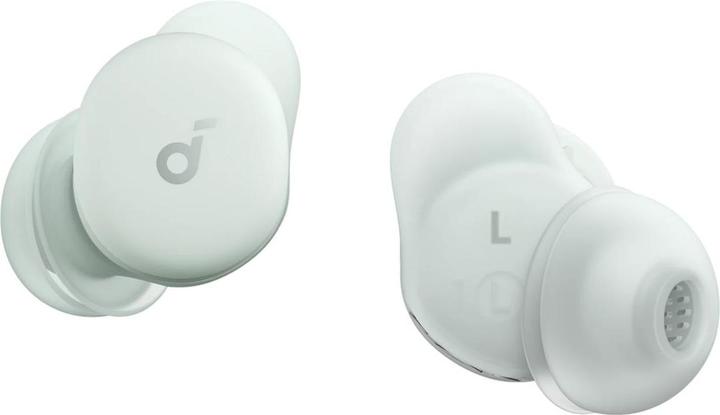

Trying to fall into a deep sleep, but someone’s snoring? These Soundcore Sleep A30 earbuds can make it happen
Want deeper, calmer, more restful sleep? Dealing with loud snoring or traffic noise? Soundcore’s Sleep A30 earbuds promise exactly that kind of slumber. I gave them a go.
For some people, falling sleep is the easiest thing in the world. They lay their head down on the pillow, shut their eyes and slumber peacefully until morning. It wouldn’t even matter if their neighbours were doing midnight trombone practice. For people like me, however, deep sleep is a rare beast. The mere crack of a branch – never mind snoring or church bells – is enough to make it slip away. And the more I chase it, the more it escapes me. That’s why I decided to give the Soundcore Sleep A30 earbuds a whirl.
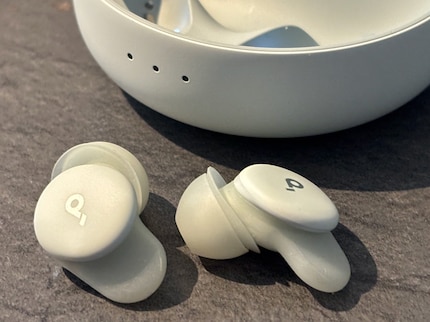
I’d tried the previous earbuds, the Sleep A20, a few times, but wasn’t entirely satisfied with them. They dug into me while I was sleeping and couldn’t do much to counteract snoring noises.
So my hopes for the Sleep A30 were all the higher. Soundcore says the earbuds’ active noise cancelling, smart sleep detection and snore masking features help them adapt to your surroundings. What’s more, they’re seven per cent flatter than the Sleep A20 buds, apparently making them suitable for side sleepers like me.
Why go for sleep earphones?
So, why don’t I just wear regular earbuds from any other manufacturer to fall asleep? Believe it or not, I’ve tried that. Whenever I did, the buds dug into me, started to hurt and fell out of my ears before I dozed off. Plus, there wasn’t much they could do about really annoying noises such as passing cars or snoring bunkmates in ski huts or shared dorms. That’s why sleep earbuds like the Sleep A30 exist. Every aspect of the buds has been fine-tuned with sleep in mind. When it comes to sound quality or battery life, however, they lag behind most standard in-ear headphones on the market. They’re simply not made for day-to-day scenarios or mind-blowing musical enjoyment. That being said, the Sleep A30 earbuds sound really well balanced, even at low volumes.
First impressions: no success without adjustments
When I first pick up the Sleep A30 earbuds, I’m impressed by their flat shape and lightness (three grammes). Now these are earbuds for side sleepers, I think to myself.
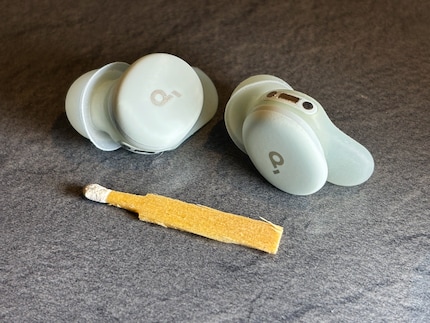
Alas, disappointment sets in during my first night with them. When I’m lying on my side, the buds press so hard into my ears that I whip them out just under two hours into the night. I know from testing other earphones that the inside of my ears are really sensitive. On the bright side, Soundcore provides an array of different silicone and memory foam tips so you can find a shape that fits you. Actually doing this, however, is no easy feat.
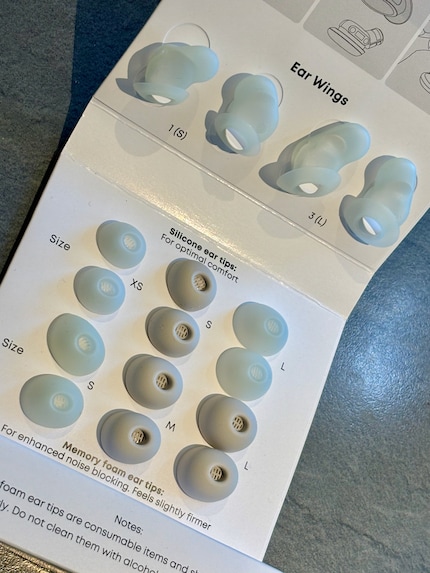
It takes me four nights to find the perfect fit. I try the memory foam tips first, as they do a better job of covering your ear canal and supposedly block out more noise. But they’re not a good fit for me. In the end, I manage to get to sleep wearing the little silicone tips. They do dig in just a little, but I’m sure that’s partly down to my sensitive ears. All this considered, it’s definitely worth experimenting with different tips.
Countless sound variations
To be honest, my first few nights with the new sleep earbuds are anything but restful. I opt to follow the app’s background noise recommendations, but these turn out to be as unsuited to me as the memory foam tips. The birdsong wakes me up randomly and the sound of running water nags at my bladder. Let’s face it, running back and forth to the loo isn’t exactly conducive to a good night’s sleep.
Having tried the nature sounds, my curiosity’s piqued by the brainwave audio – binaural beats, to be precise. Apparently, brain activity’s influenced by certain sound waves. Various studies are currently being done on how exactly this works and to what extent the listener’s perception of a piece of music as pleasant strengthens its impact.
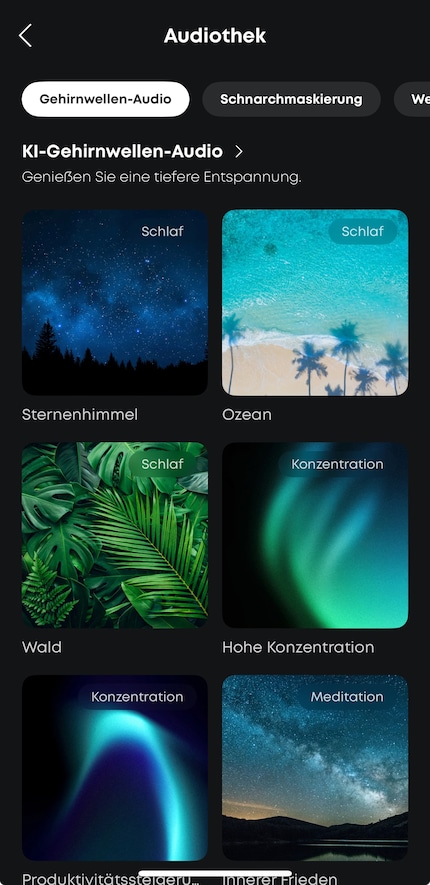
During my own little experiment, I find out that brainwave audio doesn’t exactly have a sleep-inducing effect on me. In fact, I actually feel weirdly alert and focused. Listening to the same sounds the next day at work, I get a perfect combination of undisturbed focus and nice background noise.
It isn’t until the next night, when I experiment with personalised noise in the app, that I have a breakthrough. This feature gives you the option to choose between a variety of sounds and even combine them. Some of the more unusual ones include croaking frogs, tweeting birds, barking dogs and kitchen clatter. In my case, it’s the soft, monotonous sound of gentle waves that guides me into deep sleep. My sleep report confirms it, citing 90 per cent sleep efficiency and plenty of deep sleep. Experiment successful.
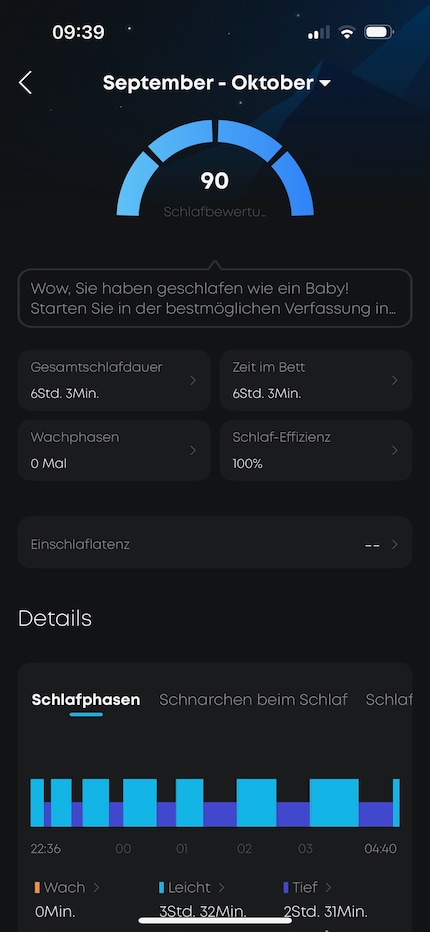
Does a good job of masking snoring
Now here comes the real test. How well do the earbuds manage to neutralise snoring noises? The Sleep A30 earbuds use three methods to clamp down on sleep-busting snoring. First, your ear canal’s covered by the silicone or memory foam tips. Then there are the soothing sounds. And last but not least, there’s the earbuds’ most powerful weapon: active noise cancelling.
This works by way of a microphone built into the charging case, which measures the frequency, volume and rhythm of the snoring. Basically, the earbuds then play an opposite acoustic signal that’s supposed to neutralise that annoying sound.
To test this feature, I play Realistic Snoring Sounds – an eleven-hour YouTube video of uninterrupted snoring. (Yes, such a thing actually exists!)
To start off, the Soundcore app recommends a suitable masking sound: a Himalayan cloudburst. Like snoring, it sounds pretty powerful. However, before I can get the experiment started, I have to load the file onto the earphones locally. This is because sleep sounds are played via the earbuds’ internal memory instead of Bluetooth. As a result, you conserve battery and can put your phone in flight mode overnight. However, since the buds have limited storage, you can only save one sound file locally at a time.
Despite my super focus on the snoring noises for the purpose of my review, the Sleep A30 buds make them fade further and further into the background. It eventually gets to the point where I still notice them, but they don’t bother me. The volume of the Himalayan cloudburst automatically adjusts to the snoring. Soothed by the sound of wind drowning out the rain, I slowly drift off to sleep. Another successful experiment!
Listen to your own music, podcasts and audiobooks
Generally speaking, I think it’s good to have a noise-reducing sleep aid for noisy environments, such as ski huts or hotels. However, sometimes you just want to listen to a podcast. And you can do exactly that via Bluetooth 5.3. One thing I find really nifty is that you can choose to have the audio either continue to play or stop once you fall asleep. The earbuds can actually detect when you drift off. Of course, the earbuds can do the same thing when streaming your favourite music from platforms like Spotify.
Passable battery life, night light and detailed sleep analysis
Soundcore says the battery lasts up to nine hours if active noise cancelling is left on all night, with music or audiobooks played via Bluetooth at 50 per cent volume for about an hour. As for the charging case, its battery holds out for 45 hours. This should be fine for most people, seeing as the earbuds are designed to help you fall asleep. Mind you, they do have an alarm feature.
Still, you can tell that the earbuds have been designed with sleep in mind on account of the charging case’s discreet lighting. This helps you find the buds in the dark – as long as they’re within easy reach on your bedside table.
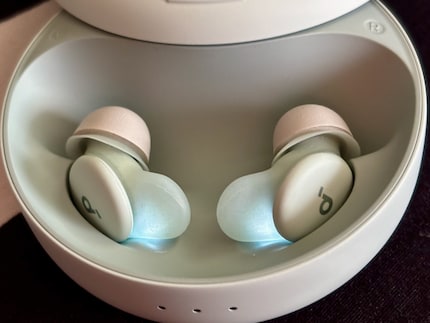
I’m also awarding some bonus points for the sleep analysis feature. Now, this took me by surprise, because I generally consider sleep tracking to be a pointless gimmick. I mean, I know myself whether I’ve slept well. Seeing as I was there the whole night, I know if it’s been a tossing-and-turning or an out-like-a-light situation.
But this sleep-tracking feature’s different. Not only does it show you how much time you’ve spent in deep sleep (18 per cent in my case), but it also gives you a typical range (13 to 23 per cent). A little more context gives the analysis more value in my book. It also provides information on each sleep phase, tossing and turning during sleep and the benefits of REM sleep. If you ask me, this background is more helpful than numerical data alone.
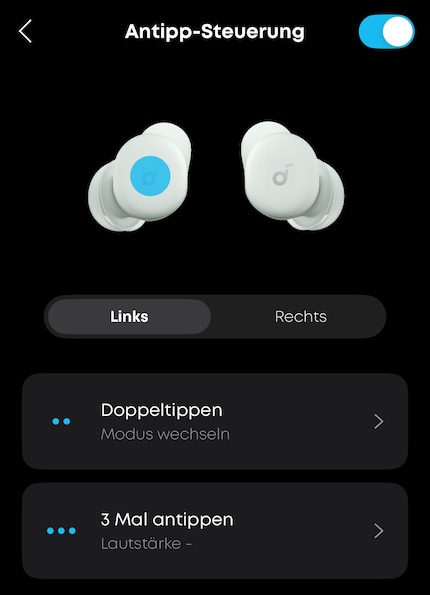
The earbud controls have been optimised to suit being worn in bed. To switch modes or adjust the volume, you have to tap the buds at least twice. This is useful, as it stops you from accidentally switching modes when you roll over in bed. I initially found the controls to be fairly unreliable, but now they work well. I’m unsure whether that’s down to a firmware update or the fact I’ve had more practice at using them now.
You can make calls with the earbuds too, but I didn’t try that feature out. Gabbing on the phone in the middle of the night wouldn’t have been that helpful in sending me off to sleep, would it?
In a nutshell
The Soundcore Sleep A30 creates good conditions for peaceful sleep
When I’m trying to sleep, I prefer my surroundings to be quiet. Having the TV on or playing background noise to help me drift off isn’t my thing. So I’d only really wear the Sleep A30 earbuds while staying in hotels or B&Bs, dealing with noisy neighbours or on nights when the whirr of thoughts buzzing around my head keeps me awake. I’d also wear them if I wanted to finish off a podcast before going to sleep. If it’s just occasional use we’re talking about, the earbuds are seriously pricey.
Anyone who likes to fall asleep to background noise will be keen on the Soundcore Sleep A30. The buds’ numerous customisation options, small fit and active noise cancelling all stack up in their favour. In my view, the fact that podcasts and music switch off automatically when you nod off is another plus point. Even more so when you consider that the feature puts less strain on your hearing than continuous background noise. In fact, sleep researchers believe background noise being used for sleep could become an issue in the long run. If you’re keen to get into the nitty-gritty of sleep quality, you might appreciate the sleep analysis provided by the app.
Overall, I’m impressed by the Soundcore Sleep A30. Compared to the previous version of the earbuds, they’re a step up in terms of fit and noise cancelling. Once I’ve done a little experimentation and grown used to them, they help me get deep, peaceful sleep and even minimise snoring noises. Pretty much the best sleep support you could expect from a pair of earphones.
Pro
- Small, flat earbuds, suitable for side sleepers too
- Active noise cancelling
- Smart snore masking
- Can be used with Bluetooth and local audio
- Customisable shape and sound
- Can be used during the day for calls and focused work

Research diver, outdoor guide and SUP instructor – I love being in, on and around water. Lakes, rivers and the ocean are my playgrounds. For a change of perspective, I look at the world from above while trail running or flying drones.
These articles might also interest you

Product test
Powerful sound, low price: the Baseus Inspire XH1’s a surprise package
by Florian Bodoky

Product test
Bose QuietComfort Ultra review: how ultra are they really?
by Florian Bodoky

Product test
Ontrac headphone review: stupendous audio quality, but the software needs improvement
by Stefanie Lechthaler